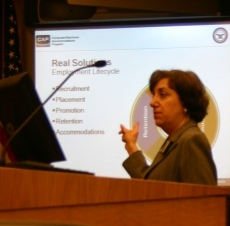Cohen Underscores Importance of Assistive Technology

Dinah Cohen, director of the Department of Defense's Computer/Electronic Accommodations Program (CAP), spoke in the McGlothlin Courtroom on April 3, and described her office's work in providing equal access for those with disabilities and urged the audience to join in the effort.
Cohen, a guest of the Center for Legal and Court Technology (CLCT) and disability rights expert Professor Michael Stein, described CAP's scope and policies and also demonstrated some of the inexpensive technological accommodations her office provides, which include computer type enlargers, screen readers, voice-recognition software, and video-captioning devices. Challenging the notion that assistive technology is useful only for those born with disabilities, Cohen observed that anyone can be injured, and have surgery, need reading glasses, or grow hard of hearing, making the further development of assistive technologies an integral component of sustainable access for all.
She also gave numerous examples of the ways in which assistive technologies have given wounded veterans opportunities to re-enter the workforce or remain on active duty. She challenged her audience to partner in the work of welcoming people who have disabilities into the workplace and to implement assistive technologies as a means of insuring equal opportunity.
Cohen has served as the director of CAP since its inception in 1990. In 2007, she received the Service to America Medal (Sammie) in recognition of her significant contributions to federal social services policy. She also is a recipient of the Strache Leadership Award, the Federal 100 Award, and the DoD Exceptional Civilian Service Award.
CLCT Director Professor Fred Lederer said that CLCT's Accessible Courts Initiative, a partnership with the American Foundation for the Blind Consulting Group, "exists to help courts accommodate those with difficulties in seeing, hearing, and moving. As Ms. Cohen pointed out, that number is growing and could include anyone of us. Assistive technology can be an important factor in making not just the courts more accessible but the world itself. Ms. Cohen's work - and that of CAP - are truly inspirational."


